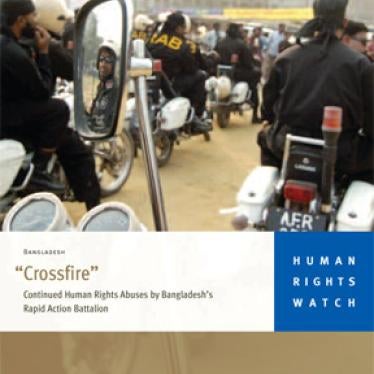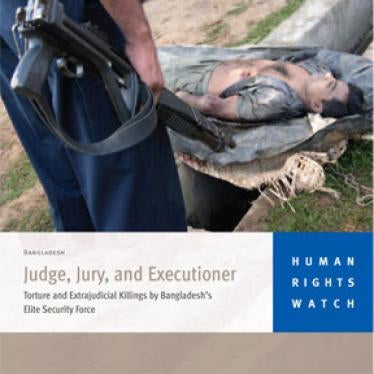(Dhaka) - The Bangladeshi government is failing to keep its commitment to end extrajudicial killings, torture, and other abuses by the Rapid Action Battalion (RAB) and hold those responsible accountable, Human Rights Watch said in a new report today.
The 53-page report, "‘Crossfire': Continued Human Rights Abuses by Bangladesh's Rapid Action Battalion," documents abuses by RAB in and around Dhaka, the capital, under the current Awami League-led government. Nearly 200 people have been killed in RAB operations since January 6, 2009, when the government assumed office. While in opposition the Awami League promised to end extrajudicial killings, but since it came to office senior government officials have denied that RAB has committed abuses, and some have even justified them.
"After two years in office, the government has had more than enough time to take action to stop the RAB's murderous practices," said Brad Adams, Asia director at Human Rights Watch. "A death squad is roaming the streets of Bangladesh and the government does not appear to be doing anything to stop it. Prime Minister Sheikh Hasina needs to act."
The report builds on the 2006 Human Rights Watch report, "Judge, Jury, and Executioner: Torture and Extrajudicial Killings by Bangladesh's Elite Security Force." It is based on over 80 interviews with victims, witnesses, human rights defenders, journalists, law enforcement officials, lawyers, and judges.
Although the government has made many commitments to end the killings and to punish perpetrators, no RAB officer or official has ever been prosecuted for a "crossfire" killing or other human rights abuse. "Crossfire" is a blanket term used to justify most of the unit's killings.
The government should either make major steps towards RAB accountability and reform in the next six months or disband it, Human Rights Watch said. Donors such as the US, United Kingdom, and Australia should immediately withdraw all assistance and cooperation until and unless dramatic improvements take place.
RAB was formed in March 2004 as a composite force comprising members from the military -army, air force, and navy - the police, and members of Bangladesh's other law enforcement groups. Members are assigned from their parent organizations, to which they return after serving with the unit. RAB operates under the Ministry of Home Affairs and is commanded by an officer not below the rank of deputy inspector general of the police or the equivalent military rank. The unit is regarded as an elite counterterrorism force and indeed has targeted, apart from criminal suspects, alleged members of militant Islamist or left-wing groups.
In often standardized press statements, the unit claims that criminals were shot and killed in "crossfire" after they or their accomplices opened fire on RAB. Investigations by Human Rights Watch and Bangladeshi human rights organizations have found, however, that many victims have been executed while in the unit's custody. Bodies of those killed have often carried marks indicating that they had been tortured. Many people who survived periods in the unit's custody have alleged that they were tortured there.
In one recent case, on March 3, RAB personnel in civilian clothes picked up Rasal Ahmed Bhutto while he was minding a friend's shop in Dhaka. Bhutto's brother-in-law, Gulam Mustafa, told Human Rights Watch that one of their relatives in the army was able to contact colleagues in RAB and extract a promise that Bhutto would not be killed in "crossfire." However, on March 10, Gulam Mustafa said, Bhutto was brought to the area where he lived in a vehicle belonging to the unit and was shot and killed. RAB summoned journalists to show the body of an alleged criminal killed in crossfire.
"They brought him and committed cold-blooded murder," Mustafa told Human Rights Watch.
Members of the Awami League were victims of RAB while in opposition, and senior party officials contended that it engaged in politically motivated killings. But the impunity the unit has enjoyed since it was established continues under the Awami League government.
Echoing their predecessors in the BNP-led government, the home minister and other government representatives deny any wrongdoing by the unit and other law enforcement agencies. Instead, they cling to the fiction that all of those killed were shot by authorities acting in self defense.
In March 2009, for example, Law Minister Shafique Ahmed told Human Rights Watch that the government had no intention of investigating allegations of past human rights abuses by security forces, even though the perpetrators remained in the unit's ranks and would be likely to continue their illegal methods. Ahmed said that even though he did not condone "crossfire" killings, it should be remembered that RAB had only killed "criminals." In May 2010, despite numerous reports by human rights groups, the minister said that, "No more crossfire incidents are taking place in the country."
Home Minister Sahara Khatun, whose ministry supervises the unit, said in January 2011 in response to allegations of rising extrajudicial executions: "Many people are talking and will talk about this. But as the home minister, I am saying that the law enforcers' task is to bring the criminals to the book." When asked about allegations by Human Rights Watch on continuing extrajudicial killings, she said: "What will the law enforcers do - save themselves or die - when criminals open fire on them."
Port and Shipping Minister Shajahan Khan has said that crossfire killings are not human rights violations and that such killings have helped to bring extortion and other crimes under control.
Disappointingly, the government has not renounced any of these comments, Human Rights Watch said. Awami League officials have consistently argued that they do not need to root out abusers because they could exercise effective political control over the battalion, a claim that is belied by the evidence during the government's more than two years in office.
In a worrying development, RAB has recently begun to carry out enforced disappearances. Bangladeshi human rights groups say that it has started killing people without acknowledging any role in their deaths.
Human Rights Watch said that after seven years of widespread abuses and more than 700 deaths, if the unit's human rights record does not improve dramatically within the next six months and abusers are not prosecuted, the Bangladeshi government should disband it. In its place the government should create a new unit within the police or a new institution that puts human rights at its core to lead the fight against serious and organized crime and terrorism. Neither RAB nor any new force created should draw its forces from the military, which has a different operating culture than a civilian police force, Human Rights Watch said.
The US, UK, and Australia should insist that the Bangladesh government follow through on its commitments and ensure that there are prompt, impartial, and independent investigations into torture and deaths in the custody of the unit, Human Rights Watch said.
"Instead of an elite law enforcement unit designed to control crime and terrorism, RAB has become a deadly law breaker," said Adams. "It is now fair to ask whether the government has any intention of addressing this scourge."
Selected Testimony from the Report
"I asked them how much money they got to kill my son and told them that they could kill me in crossfire as well. One RAB officer then grabbed my neck and said, ‘Get out of here, bitch. If you don't shut up, people here will kill you.' I asked him what he was doing there and if it was not his job to protect me. He then calmed down, asked me to leave and said that I could collect Pappu's body at Mitford hospital."
- Mother of Azad Hussein Pappu, killed by RAB on February 28, 2010
"The media was already there and RAB kept saying that Bhutto had been caught in a special operation. I started shouting at them, saying maybe Bhutto had done some bad things but where is the rule of law, how dare RAB kill Bhutto. The RAB officers just stared at me and said nothing, which frightened me. And then although some people supported me, a local Awami League leader came out and started raising slogans saying that Bhutto was a criminal anyway... RAB then took the body away for the autopsy. When I went to collect the body, I saw that there was only one bullet inside his ear. The police made me sign a blank sheet of paper. I didn't want to do it but then I just gave in."
- Gulam Mustafa, recounts the scene at the killing of a close relative
I was blindfolded and my hands were tied. I was forced to sit down. Four men in civilian clothes beat my legs with sugar cane stalks, while a man in RAB uniform sat on a chair watching. My legs were swollen like pillows.
- Baby Akhtar recounts her torture by RAB








